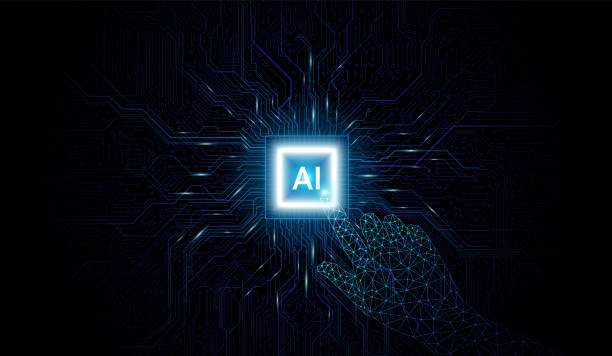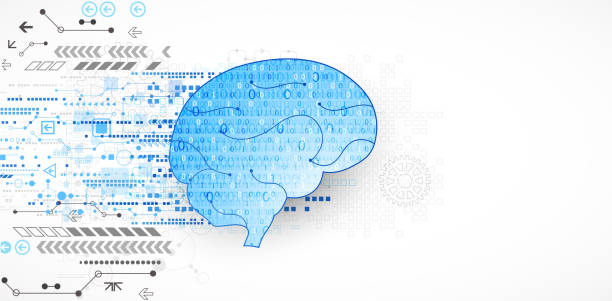What is Artificial Intelligence? Definitions, History, and Key Concepts

Artificial Intelligence (AI) in short, is an effort to simulate human intelligence in machines.
This field includes various branches such as machine learning, natural language processing, and robotics.
The main goal is to build systems that can perform tasks that currently require human intelligence, such as problem-solving, learning, reasoning, and language comprehension.
The history of #Artificial_Intelligence dates back to the 1950s when researchers began exploring the possibility of building thinking machines.
Since then, this field has made significant advancements, especially in recent years with the advent of deep learning techniques.
Key concepts in artificial intelligence include algorithms, data, neural networks, and reinforcement learning.
Each of these concepts plays an important role in the development and application of intelligent systems.
In fact, artificial intelligence is a powerful tool that can help us solve many complex challenges.
Do you have an online store but your sales aren’t what you expect? Rasaweb solves your problem forever by designing professional e-commerce websites!
✅ Significant increase in conversion rates and sales
✅ Unparalleled user experience for your customers
⚡ Click to get a free consultation with Rasaweb!
Machine Learning – The Beating Heart of Artificial Intelligence

Machine Learning (Machine Learning) is a subfield of artificial intelligence that enables machines to learn from data without explicit programming.
This process involves training a model using a set of data, so that the model can identify patterns and relationships within the data and make accurate predictions.
There are various types of machine learning algorithms, including supervised learning, unsupervised learning, and reinforcement learning.
Each of these methods is suitable for a specific type of problem.
For example, supervised learning is suitable for problems where labeled data is available (such as spam email detection), while unsupervised learning is used for problems where data is unlabeled (such as customer clustering).
Machine learning plays a very important role in the development of artificial intelligence systems, as it enables machines to learn autonomously from experiences and improve their performance without human intervention.
Natural Language Processing – A Bridge Between Human and Machine

Natural Language Processing (NLP) is a branch of artificial intelligence that enables machines to understand and generate human language.
This field includes various tasks such as machine translation, text summarization, sentiment analysis, and question answering.
Natural language processing algorithms use machine learning techniques and statistics to identify patterns and structures in language and use this information to perform linguistic tasks.
Natural language processing has wide applications in various fields, including customer service, healthcare, education, and more.
For example, chatbots use natural language processing to understand customer questions and provide appropriate answers.
Machine translation allows people to translate texts from one language to another.
In general, natural language processing plays an important role in facilitating communication between humans and machines and enables machines to have a better understanding of their surroundings.
Here is a sample table showing information about NLP algorithms:
| Algorithm | Description | Applications |
|---|---|---|
| BERT | A bidirectional transformer model for better understanding of text context. | Sentiment analysis, question answering, text completion. |
| GPT-3 | A very large language generation model capable of producing human-like text. | Content generation, translation, code generation. |
| Word2Vec | A model for creating vector representations of words based on their context. | Semantic analysis, text clustering, semantic search. |
Robotics – Combining Artificial Intelligence and Physics

Robotics (Robotics) is a branch of engineering that deals with the design, construction, operation, and application of robots.
Robots are machines that can perform tasks automatically, usually tasks that are repetitive, dangerous, or difficult for humans.
Artificial intelligence plays an important role in robotics, as it enables robots to make decisions, learn, and interact with their environment.
AI-powered robots can perform tasks such as autonomous navigation, object and person recognition, path planning, and collaboration with humans.
Robotics has wide applications in various fields, including industry, medicine, agriculture, services, and more.
For example, industrial robots are used for manufacturing tasks on assembly lines.
Surgical robots help doctors perform complex surgeries with greater precision.
Agricultural robots are used for harvesting crops and irrigating fields.
Don’t have a company website yet and missing out on online opportunities? With professional company website design by Rasaweb,
✅ Double your business credibility
✅ Attract new customers
⚡ Free consultation for your company website!
Real-World Applications of Artificial Intelligence

Artificial intelligence has currently permeated many aspects of our lives and has widespread applications in various fields.
In healthcare, artificial intelligence is used for diagnosing diseases, developing drugs, providing personalized care, and improving hospital efficiency.
In the financial sector, artificial intelligence is used for fraud detection, risk management, providing investment advice, and automating transactions.
In education, artificial intelligence is used for providing personalized education, evaluating assignments, offering feedback, and developing educational content.
In the transportation industry, artificial intelligence is used for developing self-driving cars, optimizing routes, and managing traffic.
These are just a few examples of the widespread applications of artificial intelligence in the real world.
With technological advancements, artificial intelligence is expected to play a more significant role in our lives and help solve many complex challenges.
Challenges and Limitations of Artificial Intelligence

Despite significant advancements, artificial intelligence still faces many challenges and limitations.
One of the most important challenges is the need for large amounts of high-quality data to train AI models.
Collecting and labeling data can be time-consuming and expensive.
Another challenge is the interpretability of AI models.
Many complex models, such as deep neural networks, act as black boxes, meaning it is difficult to understand how these models arrived at a particular result.
This issue can reduce trust in AI and limit its use in sensitive areas.
Furthermore, ethical issues related to AI, such as bias, discrimination, and privacy, must also be considered.
Appropriate laws and regulations must be formulated for the responsible and ethical use of AI.
The Future of Artificial Intelligence – What to Expect?

The future of artificial intelligence is very bright and full of potential.
Artificial intelligence is expected to make significant advancements in the coming years and play a more important role in our lives.
Technological advancements in areas such as deep learning, natural language processing, and robotics enable the development of more powerful and efficient AI systems.
Artificial intelligence is expected to bring about major transformations in fields such as healthcare, education, transportation, and manufacturing, and contribute to improving the quality of human life.
However, it is necessary to consider the challenges and limitations of artificial intelligence and take appropriate measures for the responsible and ethical use of this technology.
A sample table for comparing types of machine learning:
| Learning Type | Need for Labeled Data | Applications |
|---|---|---|
| Supervised Learning | Yes | Image recognition, price prediction. |
| Unsupervised Learning | No | Customer clustering, data dimensionality reduction. |
| Reinforcement Learning | No (feedback from environment) | Games, robotics. |
Artificial Intelligence and Its Impact on the Job Market

Artificial intelligence will have significant impacts on the job market.
On one hand, AI can automate many repetitive and routine jobs, leading to the elimination of some positions.
On the other hand, AI can create new job opportunities, especially in fields such as AI development, data analysis, and AI system management.
To leverage the benefits of AI in the job market and prevent its negative effects, it is necessary to keep our skills up-to-date and prepare for new jobs.
Governments and organizations must also provide appropriate training and support programs to help individuals adapt to changes in the job market.
Falling behind in competition with large online stores?
Rasaweb, with its professional e-commerce website design, brings your business online and increases your market share!
✅ Increase brand credibility and customer trust
✅ Easy shopping experience leads to more sales
⚡ Take action now for a free website design consultation!
Ethical Foundations in the Development and Use of Artificial Intelligence

The development and use of artificial intelligence are accompanied by important ethical issues.
Bias in data and algorithms can lead to discrimination and inequality.
Protecting individual privacy when using AI is very important.
Accountability for decisions made by AI systems must be clearly defined.
To use AI ethically, it is necessary to adhere to ethical principles in the design and development of AI systems and to formulate appropriate laws and regulations for the use of this technology.
Furthermore, public awareness regarding ethical issues related to AI must be increased.
How to Learn Artificial Intelligence? Resources and Learning Paths

If you are interested in learning artificial intelligence, various resources and learning paths are available to you.
You can use online courses, books, scientific articles, and practical projects to learn AI concepts and techniques.
To start, you can familiarize yourself with basic concepts such as machine learning, natural language processing, and neural networks.
Then, you can undertake practical projects using popular AI tools and libraries like TensorFlow and PyTorch to strengthen your skills.
Participating in training courses and workshops can also help you learn AI.
The most important point is practice and repetition.
By undertaking various projects and solving challenging problems, you can become an AI expert.
Frequently Asked Questions
| Question | Answer |
|---|---|
| What is the definition of Artificial Intelligence (AI)? | It is a field in computer science that aims to create intelligent machines capable of thinking, learning, problem-solving, and decision-making like humans. |
| Mention some common AI applications. | They include self-driving cars, voice assistants (like Siri and Alexa), recommendation systems (like Netflix and Amazon), facial recognition, and medical diagnosis. |
| What is the difference between Narrow AI (ANI) and General AI (AGI)? | Narrow AI specializes in one specific task, while General AI possesses human-level intellectual ability to perform any cognitive task. |
| What is Machine Learning and its relationship to Artificial Intelligence? | Machine Learning is a branch of Artificial Intelligence that focuses on developing algorithms that allow systems to learn from data without explicit programming. |
| What are Artificial Neural Networks? | They are computational models inspired by the structure and function of the human brain, used in deep learning to process data and discover complex patterns. |
| Mention some ethical challenges related to Artificial Intelligence. | They include privacy issues, bias in data and algorithms, job displacement, and accountability in case of errors or unfair decisions. |
| What is Natural Language Processing (NLP)? | It is a branch of Artificial Intelligence that focuses on enabling computers to understand, interpret, and generate human language in a useful and interactive way. |
| How can Artificial Intelligence affect the job market? | It can lead to the automation of some routine tasks, requiring worker retraining and creating new jobs in the areas of designing, developing, and maintaining AI systems. |
| What is Computer Vision? | It is a field in Artificial Intelligence that enables computers to “see,” understand, and interpret images and videos in the same way humans do, allowing them to recognize objects and faces. |
| What is the importance of data in developing AI systems? | Data is the fuel that powers AI systems, especially in machine learning. The quality and quantity of data significantly affect the accuracy and performance of models and their ability to learn and make correct decisions. |
And other advertising services from Rasaweb Advertising Agency
- Smart Marketplace: Designed for businesses seeking digital branding through intelligent data analysis.
- Smart Brand Identity: A creative platform to improve customer acquisition with intelligent data analysis.
- Smart Content Strategy: An innovative service to increase user engagement through the use of real data.
- Smart Social Media: A creative platform to improve click-through rates by precise audience targeting.
- Smart Digital Branding: An innovative service to enhance campaign management through user experience customization.
And over hundreds of other services in internet advertising, advertising consulting, and organizational solutions.
Internet Advertising | Advertising Strategy | Advertorial
Resources
Zoomit – AI Articles
Digikala Mag – AI Guides
ISNA – AI News and Technology
IRNA – AI Applications
⚡ Your business deserves the best! With Rasaweb Afarin Digital Marketing Agency, from professional website design to comprehensive digital marketing strategies, realize your digital dream.
📍 Tehran, Mirdamad Street, next to Central Bank, Southern Kazeroun Alley, Ramin Alley, No. 6




